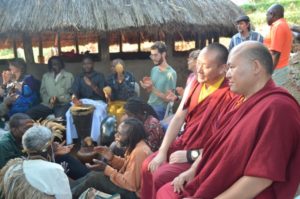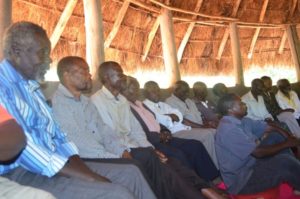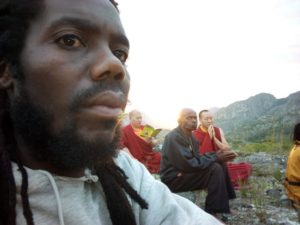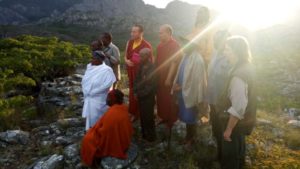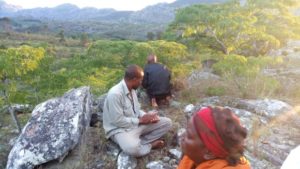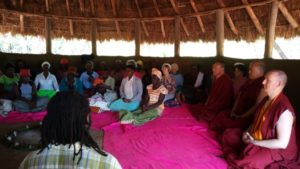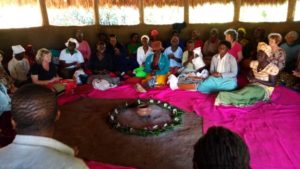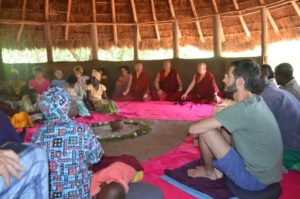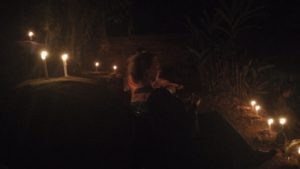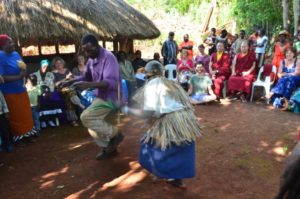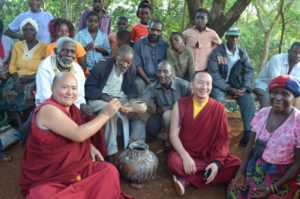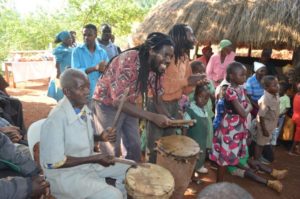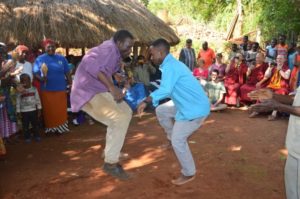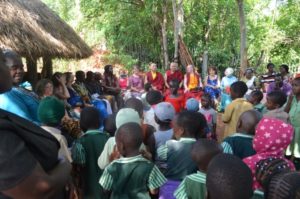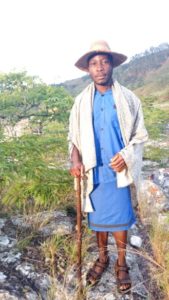Visit in Chikukwa
It is amazing, how much you can learn and live in just three and a half days! The visit of Lama Drupon Rinpoche and the Mutota, with their distinguished companions, was one such intense period of time. Chikukwa is a remote rural Zimbabwean village at the border to Mozambique, about 450 km from Harare. Village Head Percy Chikukwa was full of appreciation about the visitors: “Imagine such special people visiting our little village – the highest spirit medium of Zimbabwe travelling from his home in Guruwe and some of the most renowned Buddhist teachers travelling from monasteries in Nepal and Scotland!”
The Chikukwa community was truly honoured by this special chance to connect different views, cultures and spiritual practices. There were about 100 participating villagers – members of the mindfulness groups in Chikukwa and Hangani, community elders, Christian leaders, young people and children. There were also about 15 practitioners from the Harare Samye Dzong group and one from South Africa.
There was time for cultural practices in the Muowa part of the Chimanimani mountains of the first morning. The blessings – according to different cultural and spiritual practices – in the magic early hours of the first morning set the tone for an extraordinary opening up about cultural values and practices.
There was time for dialogue about the key elements of our cultures. We learnt about the interconnected three worlds in Shona culture – the human, natural and spiritual world. Practices at sacred sites and at homes offer links between the world of the living and the world of the dead and help people to reconnect to their roots. Trees, plants and natural elements are protected through rituals. There was intense dialogue about the relations between spirit and mind. There was time for dialogue about the important role of spirit mediums and how they can help people and communities.
There was time for dialogue about the Buddhist path. We heard that the view is essential, the aspiration to see things as they are, to seek the truth; to carry out logical inquiry and debates. Even if we do not quite manage to find the truth, the aspiration to do so sets us on the path towards Buddhist practice. The truth is very beneficial! We learnt that within the four harmful practices of killing, stealing, sexual misconduct and lying, spiritual lies are particularly harmful. They are the worst form of lying because they can affect many people. Some examples of spiritual lying are false gurus or false mediums pretending to have a spiritual connection while they do not.
There was time for dialogue about how to practise along the spiritual path. A sangha is usually a group of monks or nuns, and practitioners in Zimbabwe might rather see themselves as diligent lay practitioners (genyens). As it will be almost impossible at the moment to find authentic Lamas to deliver consistent teachings at places in Africa, the most practical way to advance Buddhist teaching would be to send people for training to Tibetan monasteries.
What a blessing to receive teachings, challenging questions and often wise answers during breakfast and evening meals. These were rare opportunities to feel the presence of High Lamas so closely.
There was time for dialogue about threats to indigenous cultures all over the world. This may be promoted by some scientists who do not believe in appearances in the mind, which cannot be proved scientifically according to their approach. In this debate, traditional culture is at risk of losing the debate and therefore being weakened or even threatened by extinction. Therefore it is beneficial to sharpen our logical inquiry into cultural and traditional phenomena.
There was time for joyful celebration of life and diversity. Children reciting poems and displaying their acrobatic skills; energetic traditional dancing and drumming; some sips of ‘seven days’ rapoko beer; lots of sweet drink, popcorn and traditional food; lots of singing and laughter.

